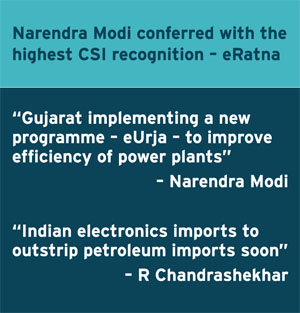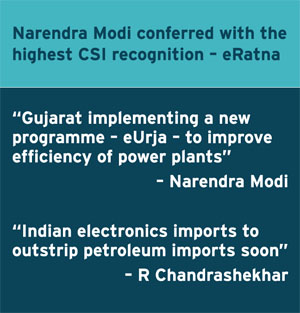
The 8th edition of the International Conference on e-Governance (ICEG) and the 3rd Knowledge Sharing Summit (KSS) were jointly organised by the Department of Science and Technology, Government of Gujarat and Gujarat Informatics Ltd in partnership with the Computer Society of India (CSI) and the Indian Institute of Technology Delhi at the Institute of Management, Nirma University, Ahmedabad on October 17 and 18, 2011.
The programme was inaugurated by Shri Narendra Modi, Hon’ble Chief Minister of Gujarat, upon whom the CSI conferred its highest honour – eRatna, in recognition of his leadership in adopting ICT for good governance in the state.
In his address, the CM said e-governance was nothing but easy, effective and economic governance that aimed at utilizing technology to bring about improvement in the lives of commoners. He also revealed that the state is in the pilot phase of a new ICT-backed project – eUrja to better manage the power generation and distribution infrastructure.

Other luminaries who spoke at the inaugural included Mr R Chandrashekhar (Secretary IT and Telecom, Government of India), Mr A K Joti (Chief Secretary, Government of Gujarat), Mr R S Saxena (Additional Chief Secretary, Department of Science and Technology, Govt of Gujarat) and Prof Akshai Aggarwal (Vice Chancellor, Gujarat Technological University).
Mr Chandrashekhar emphasised upon the need to focus on promoting hardware manufacturing capabilities, saying soon, India’s electronics import bill would far exceed its imports of crude petroleum. Mr Joti highlighted the e-Governance initiatives taken by the state and Mr Saxena emphasised that all along, the use of IT had been seen as an enabler and not an end in itself.

Sessions on Day 1 deliberated upon issues such as the role of eGov 2.0 in inclusive growth, restructuring governance and best practices for eGov 2.0. One of the key insights emerging from the discussions was that access to technology is not as big a problem as developing applications that can result in productive use of such technologies.
The need to adopt a bottom-up approach and always keep the end user in focus was repeatedly emphasised by speakers, as was the need for public private partnerships. Need to adopt emerging technologies such as cloud computing to lower costs and improve efficiencies was also highlighted.
Participants also highlighted the need for creating a compendium of all e-Governance projects so that states could learn from each other and replicate best practices while avoiding mistakes.
The importance of leadership was also highlighted in one of the sessions, with speakers bringing out the importance of a visionary and committed leader in driving change.
 Discussions also focussed on importance of emerging technologies such as cloud computing in lowering costs and improving efficiencies. It was also felt that governments ought to start moving towards a framework for Open Data from a common platform.
Discussions also focussed on importance of emerging technologies such as cloud computing in lowering costs and improving efficiencies. It was also felt that governments ought to start moving towards a framework for Open Data from a common platform.
Sessions on Day two of the KSS discussed themes such as citizen engagement, blogging and social networks, and security issues in eGov 2.0.
In a highly engaging session on blogging and social networking, issues related to the recent changes in the IT Act 2000 vide new Rules framed in 2011, importance of social media and its role in changing the very nature of governance were discussed. A case study of how the Gujarat Chief Minister’s online presence is managed by a very small core team with the help of volunteers spread worldwide was also made during discussions.
The last KSS Session focussed on security issues in eGov 2.0, and contradictions in the Right To Information Act and the IT Act were highlighted, along with some often-neglected provisions of the IT Act which could put implementing Departments in trouble. Participants also deliberated upon the issues between the need for security and protecting privacy.
Existing shortcomings such as absence of forensic investigations in analysis of security breaches and increasing sophistication of malware attacks were also discussed.
The ICEG ran concurrently with the KSS and a large number of papers were presented, highlighting ongoing research in e-Governance. At the conclusion of the conference, top three papers were presented with awards while all papers selected for being presented at the conference were recognised with participation certificates.
Be a part of Elets Collaborative Initiatives. Join Us for Upcoming Events and explore business opportunities. Like us on Facebook , connect with us on LinkedIn and follow us on Twitter, Instagram.











